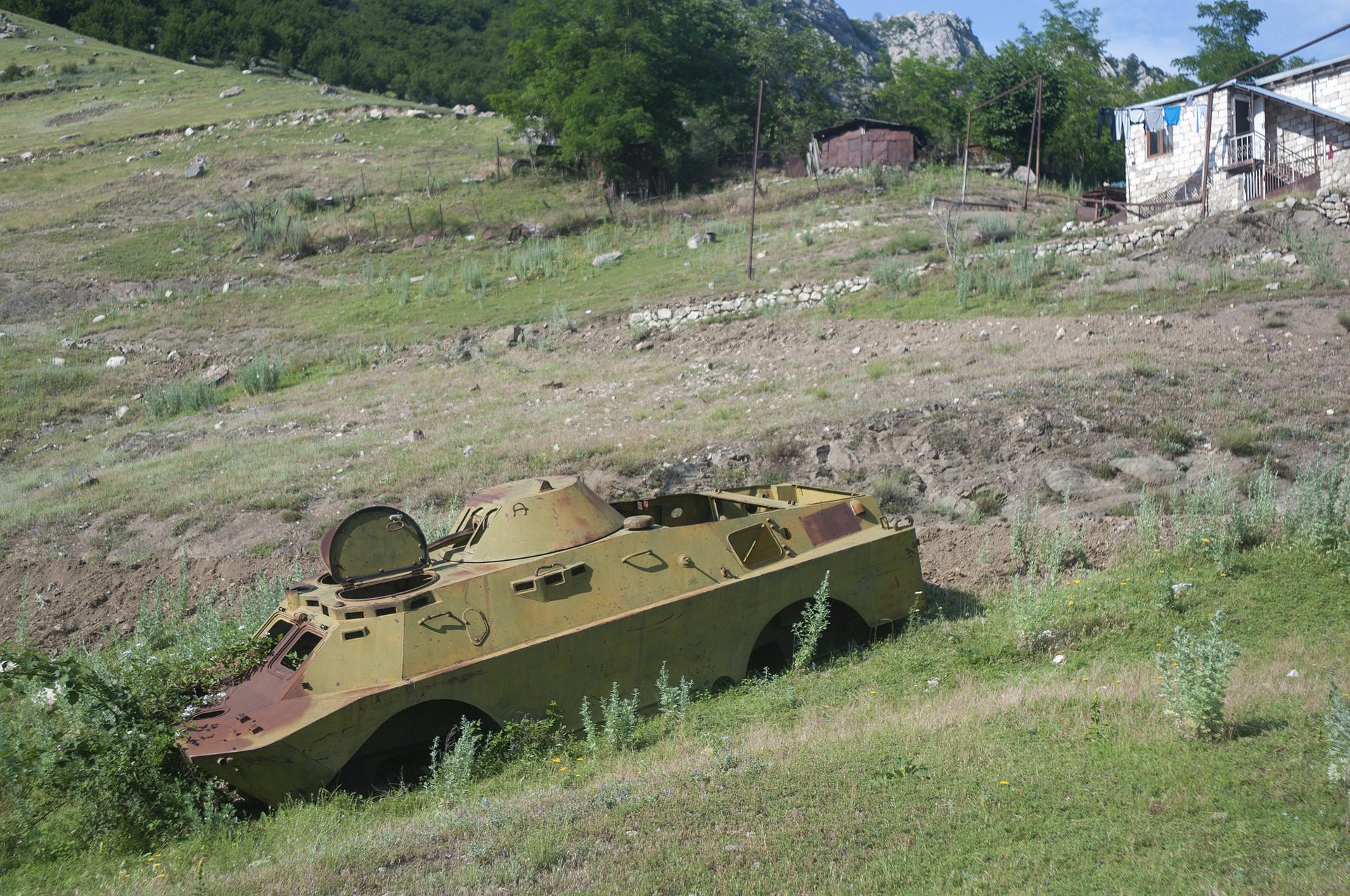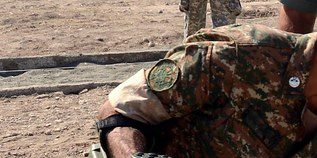Publisher,
The California Courier
The leaders of Armenia, Azerbaijan and Russia signed an agreement, calling it a “Statement,” on November 9, 2020 to stop the 45-day war in Artsakh and return to Azerbaijan the territories previously belonging to Armenians.
This shocking announcement was made by Armenia’s Prime Minister Nikol Pashinyan creating distress and despair among Armenians worldwide. There are four reasons why Armenians reacted with such pessimism and grief:
1) After 45 days of constantly hearing from Armenian officials that “We are winning,” all of a sudden we are told that we have in fact suffered a devastating defeat. Even the number of our dead soldiers was underreported, according to the latest announcement of the Armenian Health Ministry. Regrettably, the final toll is expected to be in the thousands.
2) This was probably the greatest loss since the Armenian Genocide of 105 years ago. Armenians are demoralized and deceived by their own leaders. It shook the very essence of their souls. This was a humiliating capitulation. The descendants of the Armenian Genocide, who still carry in their genes the transgenerational trauma of that greatest tragedy, are deeply affected by this enormous defeat, exposing their long unhealed wounds.
3) The thousands of young Armenian soldiers killed in the battle have deeply saddened all Armenians. Many are wondering if their sacrifice was in vain.
4) Armenians lost a large portion of their historic territories along with their homes, churches, monuments and cemeteries. Just like the effects of the Genocide a century ago are still raw in today’s generation, this latest disaster will have a lasting effect on the psyche of all Armenians.
A huge controversy has been raging in Armenia and the Diaspora after the release of this problematic “Statement.” The Armenian people, who were united like one person throughout the war, all of a sudden have been divided and at each other’s throats. There have been many ugly incidents in Yerevan which will hopefully not spill into the Diaspora. No Armenian should commit an act of violence against any other Armenian or destroy any property. Even though we have a very serious problem, attacking each other will not solve anything. At the same time, those who are engaged in peaceful protests in Yerevan should be allowed to do so without any harassment by the government. People’s right to free speech should be respected especially by a leader who came to power touting democratic rights and values.
The next controversy is identifying those responsible for this debacle. Here again we have two opposing camps. Prime Minister Pashinyan and his supporters acknowledge that he had no choice but to sign the tripartite “Statement” in order to avoid the loss of more territories to Azerbaijan and save thousands of Armenian soldiers who may have been captured or killed. Those supporting this point of view have blamed the previous presidents for enriching themselves at the expense of the nation and not strengthening the military. Pashinyan said that if he had refused to sign the “Statement,” the consequence would have been much worse for the Armenian nation. Azerbaijan would have taken over the rest of Artsakh.
Those opposed to Pashinyan’s position state that the Prime Minister is merely dumping responsibility for the defeat on his predecessors. They point out that Pashinyan made the decision to sign the “Statement” unilaterally, consulting only with the President of Artsakh and the military leaders. Pashinyan did not inform the President of Armenia, the Foreign Minister who just resigned or the Armenian Parliament. They all found out about this ill-fated announcement from the media. This was not expected from a Prime Minister who came to power as a defender of democracy and transparency. Not even France and the United States, the two other mediating members of the Minsk Group, were consulted. Pashinyan also did not respect the promise he had made on August 17, 2018, in front of the 300,000 people at the Republic Square, announcing that he “will not sign secretly any paper on Artsakh.” He added that “if there is such a situation, I will come and stand here, present to you all the details, and you will decide if we are going to accept that option or not.” Pashinyan now claims that this “Statement” is merely a ceasefire, not an agreement on the Artsakh conflict. Obviously, the signed “Statement” is much more than a ceasefire. It is the return of the seven regions in addition to giving up a large portion of Artsakh. As a result, Pashinyan’s opponents seek his resignation.
In my view, there is a much simpler explanation. Ever since the 1994 ceasefire, Armenians in and out of Armenia were totally opposed to returning the liberated territories to Azerbaijan, as were the leaders of Armenia and Artsakh. The only exception was Pres. Levon Ter-Petrosyan who wanted to make territorial concessions to Azerbaijan, as a result of which he was forced out of office. The subsequent Presidents of Armenia knew well that the Armenian people would not accept any kind of territorial concessions regarding Artsakh. Ever since the 1994 ceasefire, there have been dozens of fruitless meetings between the foreign ministers and heads of Armenia and Azerbaijan, mediated by the Minsk Group of France, Russia and the United States. The Armenian position was that we will consider returning some of the territories around Artsakh, if Azerbaijan recognized Artsakh’s independence. Armenians wanted a package deal rather than a step-by-step solution. The reason was that should Armenians give up the surrounding territories first, Azerbaijan would then be in a position to take over Artsakh itself.
In the meantime, Armenians and the rest of the world repeatedly stated that there is no military solution to the Artsakh conflict which should be resolved through peaceful negotiations. However, Pres. Aliyev kept threatening to use military force to recover the lost territories. Using its huge oil income, Azerbaijan bought billions of dollars of sophisticated weapons from Israel, Russia and others. Armenia also bought some weapons, but did not have the resources to match Azerbaijan’s military buildup. Armenians did not take Aliyev’s threats seriously. Finally, Azerbaijan secured the support and participation of the powerful Turkish military and recruited several thousand Islamist terrorist mercenaries to fight on its side. The highly technological war with remote control drones and missiles devastated the Armenian military and conquered what Armenia and Artsakh was not willing to give up, despite the heroic efforts of the Armenian soldiers.
Therefore, rather than asking who is to blame for this fiasco, Armenians need to acknowledge that we paid the price for being unable to counter the powerful weapons of Azerbaijan and Turkey which has the second most powerful military in NATO. As Prime Minister Pashinyan acknowledged, if he had conceded some of the territories around Artsakh earlier, there would not have been this capitulation. However, if we had given up these areas without an agreement on the final status of Artsakh, Azerbaijan would have then attacked and captured Artsakh itself.
There are two basic facts that we must all admit:
1) The powerful side always wins in a war, no matter how just the weaker side’s cause is. Armenians did not use the last 26 years to turn Artsakh into an impenetrable fortress. They should have had a defense system to shield Artsakh from drone attacks.
2) When you are weak and rely on others to save you, you would be disappointed and defeated. Armenians kept saying that we were left alone. This is not surprising. All countries make decisions based on their own national interests.
The “Statement” signed by Pashinyan is devastating. We need to find a way to minimize our losses. Besides losing the territories in and around Artsakh, we should not have agreed to provide a corridor through Armenia to Azerbaijan to connect with Nakhichevan. This would allow Turkey to cross Armenia by land and link with Azerbaijan and beyond to other Turkic republics. This is the realization of Turkey’s Pan-Turanian dream which we should not permit at all cost.
Finally, the text of the “Statement”, which is the equivalent of a treaty according to Armenia’s constitution, should be submitted to Armenia’s Constitutional Court and the Parliament for ratification. Otherwise, it would have no legal value. Armenia should also involve France and the United States, the other two Minsk Group of mediators, in the negotiation process to get a better deal.
Even though Pashinyan acknowledged that as Commander-in-Chief he is responsible for Armenia’s defeat, he refuses to resign. Therefore, a referendum should be held to see if the Armenian public approves or rejects the “Statement.” If they reject it, Pashinyan would have no choice but to resign. The elected new leader, hopefully not one from the discredited previous regimes, would then try to negotiate a revised agreement considering the one signed by the ousted Pashinyan to be null and void. This option, however, carries the risk of a fresh attack on Artsakh by Azerbaijan.
I hope Armenia’s new leaders will go through this traumatic experience with sound judgment and concentrate their energies on building a powerful military so they can counter any future attacks by Azerbaijan and Turkey. Finally, this is the right time for Armenia to recognize Artsakh’s independence or its unification with Armenia, thereby introducing an unexpected new factor in the negotiations with Azerbaijan.



